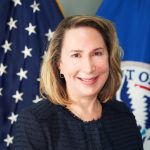Geos scientist testifies in congress on climate change and forest fires
On Wednesday September 27, 2017 the House Natural Resources Subcommittee on Oversight and Investigations held a hearing on wildfire policy. Geos Institute’s President and Chief Scientist Dr. Dominick DellaSala testified. You can read his full testimony here, read his Questions for the Record statement, watch a video of the hearing, and read coverage by E&E Daily below.
Watch a video of the hearing
Dominick’s testimony begins at approximately 31:00
Read the coverage by E&E Daily
Barrasso vows to address wildfires by year’s end
Marc Heller, E&E News reporter
Published: Thursday, September 28, 2017
Senate Environment and Public Works Chairman John Barrasso (R-Wyo.) led one of two hearings yesterday on wildfires. Environment and Public Works Committee
Senate Environment and Public Works Chairman John Barrasso said yesterday he’ll try to push changes in forest management policy through the panel by year’s end, in response to another record-setting year for wildfires.
After a hearing on three bills aimed at speeding forest-thinning projects, the Wyoming Republican said he’ll make the issue a priority, riding alongside — or in — legislation to provide a long-term funding solution for wildfires.
“We want to get this done this year,” Barrasso told reporters. “I think it’s an opportunity we haven’t had in the past, and a lot of it has to do with some of the emergency relief that people around the country need, and that certainly applies to the Pacific Northwest and the Rocky Mountain West.”
Barrasso said he’s working with several Western senators, including Sens. Ron Wyden (D-Ore.) and Maria Cantwell (D-Wash.), on a measure that could end the Forest Service’s need to transfer money from non-fire accounts to pay for blazes.
How far Congress may go in lowering regulatory hurdles is the sticking point, lawmakers and lobbyists say. Most of the agreement among lawmakers, industry and conservation groups appears to focus on narrowly targeted forest thinning, federal collaboration with local officials and limitations on lawsuits against projects.
Legislation that goes further, by expanding how many acres can be exempted from more rigorous environmental review, continues to divide lawmakers and has raised objections from environmental groups.
The hearing did reveal some points of agreement that could shape any legislative package. “There’s a bipartisan path forward,” said Collin O’Mara, president and CEO of the National Wildlife Federation.
The group backs S. 1842, by Wyden and Sen. Mike Crapo (R-Idaho), to end fire borrowing, as well as S. 605, by Montana Sens. Steve Daines (R) and Jon Tester (D), to reduce litigation and provide more collaboration among federal, state and local authorities on forest projects.
The administration has said it may transfer as much as $600 million out of other accounts to pay for wildfire this year; Wyden and Crapo’s legislation would create emergency funding in future budgets so that fires are treated like hurricanes or other natural disasters. More than 8 million acres have burned nationwide this year, the Forest Service has said.
Daines and Tester’s legislation, called the “Litigation Relief for Forest Management Projects Act,” would reverse the 2015 9th U.S. Circuit Court of Appeals decision that obligated the Forest Service to consult more with the Fish and Wildlife Service on endangered species potentially affected by projects. The Obama administration opposed the Cottonwood ruling, as does the Trump administration.
O’Mara said his organization also supports S. 1417, by Sens. Orrin Hatch (R-Utah) and Martin Heinrich (D-N.M.), to allow more removal of invasive juniper and pinyon pine.
O’Mara called it a “good start” toward forest management challenges in those states. That bill is called the “Sage Grouse and Mule Deer Habitat Conservation and Restoration Act.” Those trees harm mule deer and sage grouse habitat and feed wildfires, Hatch told the committee.
‘Massive, bipartisan’
By gearing discussion toward the approaches of Daines and Hatch, O’Mara said, lawmakers could reach a “massive, bipartisan” agreement on wildfire management.
Another bill the committee considered, by Sen. John Thune (R-S.D.), goes “a little too far,” O’Mara said, by expanding from 3,000 acres to 10,000 acres the area eligible for categorical exclusions from reviews under the National Environmental Policy Act. That bill, S. 1731, is called the “Forest Management Improvement Act.”
Most Forest Service categorical exclusions fall well short of 3,000 acres, suggesting the agency isn’t using them to the extent the law already allows, said Delaware Sen. Tom Carper, the panel’s ranking Democrat.
To critics of categorical exclusions, their expansion would undermine environmental laws; O’Mara said the NWF prefers narrowly targeted measures, as in Hatch’s bill.
Advocates say the predominance of small categorical exclusions suggests they need to be used on a bigger scale to reduce wildfire risk and attack infestations for instance.
“It really doesn’t get the job done,” Barrasso told reporters.
In the House
While senators appear to closing the gap on wildfire policy, the House hasn’t shown as much progress. At a hearing on the same issue yesterday, Democrats and Republicans on the House Natural Resources Subcommittee on Oversight and Investigations came at the debate from opposite directions.
The panel’s ranking Democrat, Virginia Rep. Donald McEachin, said Republicans were ignoring climate change as the driving force behind increased catastrophic fires, despite eight hearings in two sessions of Congress.
“I think recycling is a good idea, but not like this,” McEachin said.
Republicans said more aggressive thinning of forests would make them healthier and less fire-prone. One member, Rep. Paul Gosar (R-Ariz.), called a witness who disagreed a “fake scientist.”
The witness, Dominick DellaSala, is director of the Geos Institute in Ashland, Ore., and received his doctorate in natural resources from the University of Michigan in 1986, as well as a master’s degree in ecology from Wayne State University in 1982, according to his résumé on the group’s website.
His writings on fire ecology have pitted him against timber interests and some of the common wisdom in forest management circles.
DellaSala told the subcommittee that his research suggests that while thinning makes sense in some locations, timber operations tend to increase the risk of severe wildfire.
Instead of increasing harvests, he said, policymakers should focus on protecting homes in the wildland-urban interface and using fire-resistant construction in those areas, while tackling climate change in the long run.
“We’ve got to learn to coexist with these fires,” DellaSala said.
The chairman of the subcommittee, Rep. Bruce Westerman (R-Ark.), a forester by training, has sponsored legislation to address fire borrowing and loosen environmental regulations around forest management. That bill is the “Resilient Federal Forests Act,” H.R. 2936.
Related Resources
Contribute
Geos Institute depends on the generous support of caring people who believe we can and must do a better job addressing climate change for our children and those who will follow.
Stay Updated!
Sign up for our eNews to stay updated on our work and receive information you can use to build resilience in your community.

 Robert Macnee, Ph.D. is Deputy Director of Resilience Services at Climate Resilience Consulting, where he helps governments, institutions, and communities reduce climate risk in equitable and practical ways. He holds a Ph.D. in Environmental Management focused on climate change impacts on health and communities, and brings over a decade of experience spanning economic development, resilience planning, and implementation.
Robert Macnee, Ph.D. is Deputy Director of Resilience Services at Climate Resilience Consulting, where he helps governments, institutions, and communities reduce climate risk in equitable and practical ways. He holds a Ph.D. in Environmental Management focused on climate change impacts on health and communities, and brings over a decade of experience spanning economic development, resilience planning, and implementation. Samantha Medlock is President of Climate Risk Advisors, helping communities and organizations advance equity, sustainability, and resilience. Her career began chasing floods as a local official in Texas Flash Flood Alley—a hands-on experience that still shapes her approach to climate and disaster risk management.
Samantha Medlock is President of Climate Risk Advisors, helping communities and organizations advance equity, sustainability, and resilience. Her career began chasing floods as a local official in Texas Flash Flood Alley—a hands-on experience that still shapes her approach to climate and disaster risk management.
 Arsum is the Senior Adaptation and Coastal Resilience Specialist for the National Wildlife Federation’s Southcentral Region. In this role, she advances climate adaptation efforts, with a focus on nature-based approaches to address the impacts of climate change and extreme events across the Gulf region. She has authored and co-authored numerous publications on climate impact assessments and adaptation solutions. Additionally, she regularly participates in state-based coastal resilience and hazard mitigation planning across the Gulf, collaborating with regional and local stakeholders.
Arsum is the Senior Adaptation and Coastal Resilience Specialist for the National Wildlife Federation’s Southcentral Region. In this role, she advances climate adaptation efforts, with a focus on nature-based approaches to address the impacts of climate change and extreme events across the Gulf region. She has authored and co-authored numerous publications on climate impact assessments and adaptation solutions. Additionally, she regularly participates in state-based coastal resilience and hazard mitigation planning across the Gulf, collaborating with regional and local stakeholders. Jim is a multilingual world traveler. Based in Bavaria during the 1970s, Jim spent most of this period in India, Afghanistan and Nepal, where he founded and operated a charitable medical clinic serving Tibetan Refugees. He settled in Oregon in 1983 on a forested ranch in the Umpqua National Forest.
Jim is a multilingual world traveler. Based in Bavaria during the 1970s, Jim spent most of this period in India, Afghanistan and Nepal, where he founded and operated a charitable medical clinic serving Tibetan Refugees. He settled in Oregon in 1983 on a forested ranch in the Umpqua National Forest. Dr. Micah Hahn is an Associate Professor of Environmental Health in the Institute for Circumpolar Health Studies at the University of Alaska-Anchorage. She received her joint PhD in Epidemiology / Environment and Resources from the University of Wisconsin-Madison and her MPH in Global Environmental Health from Emory University. Subsequently, she was a postdoctoral fellow for the CDC Climate and Health Program, and in this position worked collaboratively with the CDC Division of Vector-borne Diseases and the National Center for Atmospheric Research. Her research focuses on understanding the health impacts of climate change and working with communities to develop locally-relevant adaptation and resilience-building strategies. Dr. Hahn is also on the Management Team of the Alaska Climate Adaptation Science Center.
Dr. Micah Hahn is an Associate Professor of Environmental Health in the Institute for Circumpolar Health Studies at the University of Alaska-Anchorage. She received her joint PhD in Epidemiology / Environment and Resources from the University of Wisconsin-Madison and her MPH in Global Environmental Health from Emory University. Subsequently, she was a postdoctoral fellow for the CDC Climate and Health Program, and in this position worked collaboratively with the CDC Division of Vector-borne Diseases and the National Center for Atmospheric Research. Her research focuses on understanding the health impacts of climate change and working with communities to develop locally-relevant adaptation and resilience-building strategies. Dr. Hahn is also on the Management Team of the Alaska Climate Adaptation Science Center. Michael is a former Founding Principal of Resilient Cities Catalyst, a global non-profit helping cities and their partners tackle their toughest challenges. He is currently the Executive Director of Climate Resilience Academy at the University of Miami.
Michael is a former Founding Principal of Resilient Cities Catalyst, a global non-profit helping cities and their partners tackle their toughest challenges. He is currently the Executive Director of Climate Resilience Academy at the University of Miami. Dr. Quintus Jett is a consultant, educator, and strategist for public causes. He has a doctorate in Organizations & Management from Stanford University, and a two-decade faculty career which spans schools, departments, and programs of business, engineering, liberal studies, divinity, and public and nonprofit management. Following Hurricane Katrina in 2005, Dr. Jett launched a volunteer project in New Orleans, which enlisted residents, students from over a dozen colleges and universities, and hundreds of others to field map the city’s Gentilly district, Lower Ninth Ward, and New Orleans East. Dr. Jett is an innovator in higher education, bridging the divide between academic research and the other priorities of the modern university, including student access and diversity, community engagement, and providing foundations for life-long learning in today’s rapidly changing world.
Dr. Quintus Jett is a consultant, educator, and strategist for public causes. He has a doctorate in Organizations & Management from Stanford University, and a two-decade faculty career which spans schools, departments, and programs of business, engineering, liberal studies, divinity, and public and nonprofit management. Following Hurricane Katrina in 2005, Dr. Jett launched a volunteer project in New Orleans, which enlisted residents, students from over a dozen colleges and universities, and hundreds of others to field map the city’s Gentilly district, Lower Ninth Ward, and New Orleans East. Dr. Jett is an innovator in higher education, bridging the divide between academic research and the other priorities of the modern university, including student access and diversity, community engagement, and providing foundations for life-long learning in today’s rapidly changing world. Scott is Monfort Professor of Atmospheric Science at Colorado State University. He has written about 100 publications in the peer-reviewed climate literature, is a former editor of the Journal of Climate, and served for five years as founding Science Chair of the North American Carbon Program.
Scott is Monfort Professor of Atmospheric Science at Colorado State University. He has written about 100 publications in the peer-reviewed climate literature, is a former editor of the Journal of Climate, and served for five years as founding Science Chair of the North American Carbon Program. Linda has many years of experience in disaster preparedness and resilience. She has been an elected official on the Linn County Iowa Board of Supervisors, Chair of the Metropolitan Planning Organization, the East Central Iowa Council of Governments, the statewide Mental Health Developmental Disability and the Linn County Board of Health. Langston is a former president of the National Association of Counties (2013-2014).
Linda has many years of experience in disaster preparedness and resilience. She has been an elected official on the Linn County Iowa Board of Supervisors, Chair of the Metropolitan Planning Organization, the East Central Iowa Council of Governments, the statewide Mental Health Developmental Disability and the Linn County Board of Health. Langston is a former president of the National Association of Counties (2013-2014). Ken works with families and organizations as a mediator, organizational consultant, trainer and facilitator. Along with his passion for helping people prepare for and reduce climate change, Ken also volunteers as a mediator through Mediation Works and is passionate about supporting youth through mentoring with Boys to Men of Southern Oregon.
Ken works with families and organizations as a mediator, organizational consultant, trainer and facilitator. Along with his passion for helping people prepare for and reduce climate change, Ken also volunteers as a mediator through Mediation Works and is passionate about supporting youth through mentoring with Boys to Men of Southern Oregon. Matthew is a retired high school teacher who was once honored as Oregon High School Social Studies Teacher of the Year. Before his teaching career he was in the restaurant business in Portland. He is also a lawyer who has been a member of the Oregon State Bar Association since 1980.
Matthew is a retired high school teacher who was once honored as Oregon High School Social Studies Teacher of the Year. Before his teaching career he was in the restaurant business in Portland. He is also a lawyer who has been a member of the Oregon State Bar Association since 1980. Andrea is the Resilience Policy Advisor for the North Carolina Office of Recovery and Resiliency. She works across state agencies and with local governments to increase the state’s resilience to the impacts of climate change.
Andrea is the Resilience Policy Advisor for the North Carolina Office of Recovery and Resiliency. She works across state agencies and with local governments to increase the state’s resilience to the impacts of climate change.